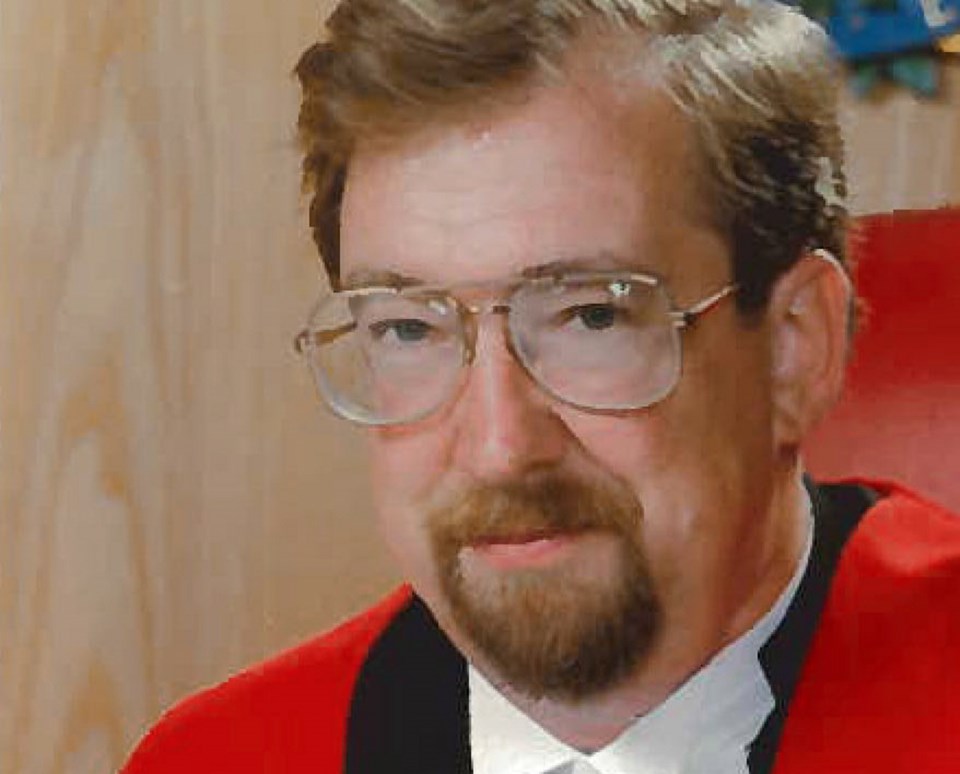Josiah (Joe) Wood stood up for anyone charged with a criminal offence.
The 73-year-old Duncan provincial court judge died early Monday after a short bout with pancreatic cancer.
His career, by any measure, was remarkable. Wood graduated from UBC law school in 1967 along with former B.C. attorney general and justice Wally Oppal.
“Joe was a civil libertarian — he defended people who needed to be defended and he cared for people who were poor,” said Oppal, a good friend, on Thursday.
Wood’s talent as a courtroom lawyer was evident early in his career, said Oppal.
Wood was an articling student for former lawyer Bill Deverell, now a bestselling author: “A supremely skilled trial lawyer who charmed juries not by being a wily courtroom thespian but by being true to himself, honest, straightforward and caring, with a quick wit and gentle, self-deprecating touch,” wrote Deverell in an email.
Wood acted as defence counsel for those charged in the Gastown Riot of Aug. 7, 1971.
Vancouver police, under the direction of then mayor Tom Campbell, clashed with 2,000 youth supporting the legalization of marijuana. About 80 protesters were arrested and 38 were charged, many complaining of police using excessive force.
“Mayor Tom Campbell decided these hippies were enemies of the state and he invoked the War Measures Act … where loitering was to be an offence,” recalled Oppal.
Wood’s talent was noted by colleagues, and he was promoted to the B.C. Supreme Court bench in 1983. In 1989, he was appointed to the B.C. Court of Appeal — B.C.’s highest court — and he stayed there until 1996, when he decided to return to private practice.
“It’s tough being a judge, you don’t make the kind of money you’d make in private practice [as a lawyer],” Oppal said.
But the rules of the Vancouver law firm would have forced Wood to retire earlier than he wanted, so he applied for a job as a provincial court judge and was assigned to Duncan.
Wood is the only provincial court judge with a resumé that included stints at the two higher levels of the B.C. judiciary.
His reasons for returning to court, and the relatively modest pay of a provincial court judge, lay in his empathy for people who needed help, Oppal said. In that vein, Wood started an aboriginal court in Duncan to handle the unique challenges faced by aboriginal people in the court system.
Robert Bauman, chief justice of B.C., said Wood’s accomplishments were extraordinary.
“Judge Wood combined exceptional legal and intellectual skills with an exceedingly strong sense of compassion and humanity,” Bauman said in a statement.
“As a judge, Joe Wood has touched and enriched the lives of many citizens and communities in British Columbia. Our court mourns his passing.”
Oppal said that Wood often commented that he enjoyed provincial court “because it’s really the court of the people.”
When, just two weeks ago, Wood learned he had terminal cancer, he phoned his friend Oppal.
“He said ‘I’m going to go start straightening out my affairs. Then he said, ‘I’ve got two judgments I need to put out.’ That’s typical Joe,” said Oppal.
“I said, ‘Joe, never mind your judgments — take care of your health.’ That was the last conversation I had with him.”
Wood didn’t want a “fuss,” so no memorial service has been planned, Oppal said.
Oppal said he’ll remember Wood “as a true friend, someone who was always there and someone who gave so much of himself to the province and the country.”
Chief Judge Tom Crabtree of the B.C. provincial court said Wood “was an inspirational judge, and showed how treating people with compassion and respect can make a difference in people’s lives.”
People come to provincial court with real problems that need to get sorted out, he said.
“I think why Josiah Wood enjoyed it so much is this allowed him to engage with people on a one-to-one basis.”
Along with his dearly beloved wife Tina, Josiah is survived by their sons Jeremy and James; Jeremy’s wife, Tina, and their daughter Sadie and son Josiah; James’s daughters Cassandra and Nicole, and his partner Cathy.



